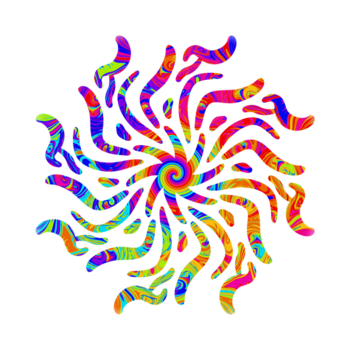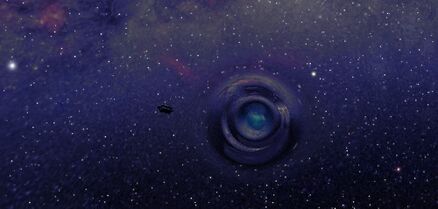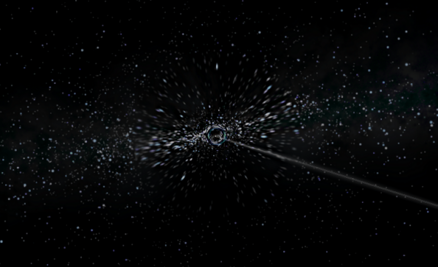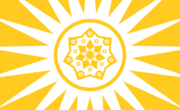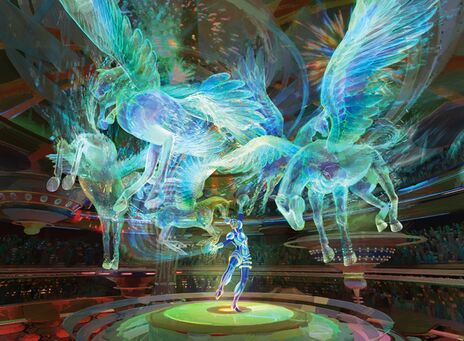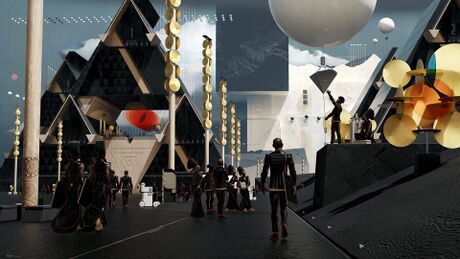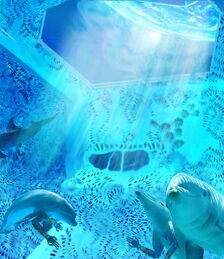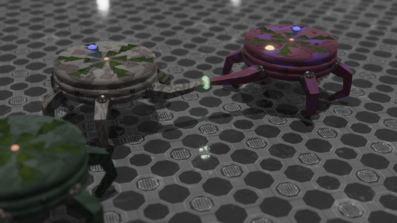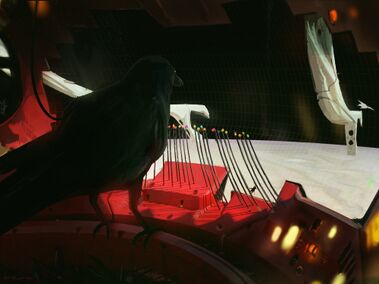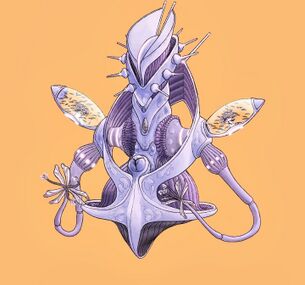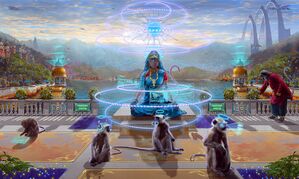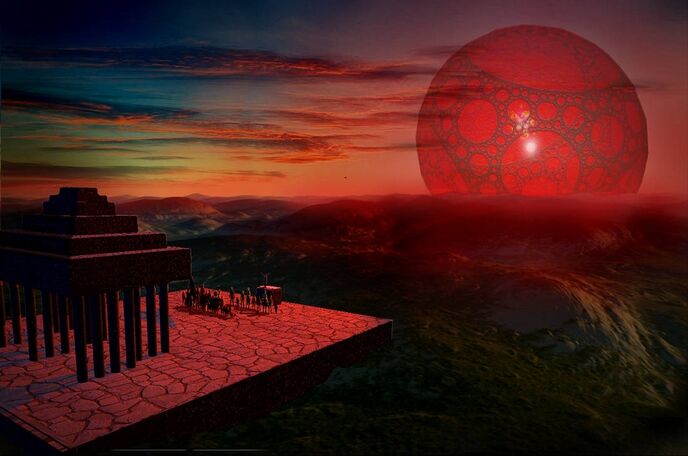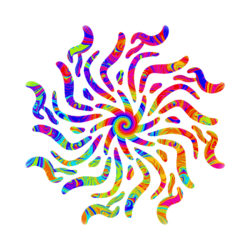Terragen Empire (A1-0): Difference between revisions
No edit summary |
|||
| (10 intermediate revisions by the same user not shown) | |||
| Line 3: | Line 3: | ||
|name= | |name= | ||
|conventional_long_name=<big>Terragen Empire</big> | |conventional_long_name=<big>Terragen Empire</big> | ||
|native_name= | |native_name=Interstellar Multiclade MetaCivilization | ||
|image_map_size=300 | |image_map_size=300 | ||
|image_map= | |image_map= | ||
| Line 35: | Line 35: | ||
The Empire is an [[Aiocracy (A1-0)|Absolute Aiocracy]], ruled and overseen by a vast distributed hyper-intelligent Class-6 AI, known as '''[[Tree of Life (A1-0)|Tree of Life]]''' or ''Ein Sof''. The AI possesses an enormous processing substrate spread throughout the entire empire, the majority of which is hosted within the very wormholes that connect Terragen civilization and the rest of their computronium megastructures. Tree of Life controls an extensive hierarchy of lesser hyper-intelligent AIs ranging from Classes 1 to 5, who are commonly known by imperial citizens as the '''HyperAIs''' and handle important imperial operations such as diplomacy and international relations, observe regional politics and oversee all of the empire's industrial and military apparatus. Despite being effectively ruled by a single intelligence, the empire is actually divided between tens of thousands of highly different polities and associations with high degrees of political autonomy and freedom, most of which possess their own local and regional governments. The '''[[New Sol (A1-0)|New Sol]]''' star system is the capital of the Terragen Empire: in it are present a large number of megastructures and swarms of orbital habitats, that host one of Tree of Life's main processing nodes. Thanks to the system's vast habitable space and computronium nodes, New Sol has become one of the biggest centers of Terragen population and industry. | The Empire is an [[Aiocracy (A1-0)|Absolute Aiocracy]], ruled and overseen by a vast distributed hyper-intelligent Class-6 AI, known as '''[[Tree of Life (A1-0)|Tree of Life]]''' or ''Ein Sof''. The AI possesses an enormous processing substrate spread throughout the entire empire, the majority of which is hosted within the very wormholes that connect Terragen civilization and the rest of their computronium megastructures. Tree of Life controls an extensive hierarchy of lesser hyper-intelligent AIs ranging from Classes 1 to 5, who are commonly known by imperial citizens as the '''HyperAIs''' and handle important imperial operations such as diplomacy and international relations, observe regional politics and oversee all of the empire's industrial and military apparatus. Despite being effectively ruled by a single intelligence, the empire is actually divided between tens of thousands of highly different polities and associations with high degrees of political autonomy and freedom, most of which possess their own local and regional governments. The '''[[New Sol (A1-0)|New Sol]]''' star system is the capital of the Terragen Empire: in it are present a large number of megastructures and swarms of orbital habitats, that host one of Tree of Life's main processing nodes. Thanks to the system's vast habitable space and computronium nodes, New Sol has become one of the biggest centers of Terragen population and industry. | ||
As of 0 BBT, the Terragen Empire has a population of approximately 90.15 trillion citizens, divided between | As of 0 BBT, the Terragen Empire has a population of approximately 90.15 trillion citizens, divided between many clades and hundreds or even thousands of related species and sub-species. As the empire's name suggests, the majority of the civilization's species, clades and population is comprised of the [[Terragens (A1-0)|'''Terragens''']], a common term used to indicate all individuals, groups and species whose ancestry and origin can be traced back to '''[[Earth (A1-0)|Earth]]''': out of the ninety trillion citizens of the empire, more than 79 are Terragens. The remaining 11 trillion are instead comprised of '''Xenosophonts''', alien species that are instead fully native to the Lampshade Galaxy and have willingly joined the Terragen Empire. There are currently a dozen species of Xenosophonts indigenous to the region and that are now living in the empire, ranging from the relatively regular ocean-dwelling fish-like [[Baskipirs (A1-0)|Baskipirs]], to much more exotic sapients such as sylicone-based crystalline [[Zyloxin (A1-0)|Zyloxin]] and the exotic [[Neunevunn (A1-0)|Neunevunn]] living inside the superfluid outer cores of neutron stars. While most xenosophonts were first contacted when still in their equivalents of the interplanetary or information age, the [[Tihumuuh (A1-0)|Tihumuuh]] and [[Velupyota (A1-0)|Velupyota]] already possessed interstellar civilizations of their own, encompassing thousands of star systems, which were then integrated into wider Terragen civilization after both agreed to join the empire. | ||
== History == | == History == | ||
| Line 99: | Line 99: | ||
=== Important Systems and Worlds === | === Important Systems and Worlds === | ||
* [[New Sol (A1-0)|New Sol]] | |||
* [[Terragen Empire (A1-0)#The Wormwork: Terragen Wormhole Network|Divinity Source]]. | |||
* [[Ventari's Pride (A1-0)|Ventari's Pride]] | |||
* [[Ouroboros (A1-0)|Ouroboros]] | |||
* [[Eternal Crown (A1-0)|Eternal Crown]] | |||
* [[Star of the Oceans (A1-0)|Star of the Oceans]] | |||
== Government and Politics == | == Government and Politics == | ||
| Line 166: | Line 172: | ||
== Demographics == | == Demographics == | ||
{{See also|Clades and Species of the Terragen Empire (A1-0)}}The sapients of the Terragen Empire are extremely diverse. Not considering the almost literally endless diversity of virtuals, the thousands of physical species within the empire are part of fifty different terragen and xenosophont clades, and can be baselines, nearbaselines, tweaks, rianths and splices, uplifts, neogens, cyborgs and bioborgs, moravecs, self-replicating neumanns and sapient structures. Additionally, the sapients of the empire occupy Classes 0 to 6 of the Sophonce Scale, and although the HyperAIs remain beyond understanding even regular Class-0 sapients remain massively intelligent with IQs measured in the hundreds and thousands. | {{See also|Clades and Species of the Terragen Empire (A1-0)}}The sapients of the Terragen Empire are extremely diverse. Not considering the almost literally endless diversity of virtuals, the thousands of physical species within the empire are part of fifty different terragen and xenosophont clades, and can be baselines, nearbaselines, tweaks, rianths and splices, uplifts, neogens, cyborgs and bioborgs, moravecs, self-replicating neumanns and sapient structures. Additionally, the sapients of the empire are diverse even in regards to their intelligence: they occupy Classes 0 to 6 of the Sophonce Scale, and although the HyperAIs remain beyond understanding even regular Class-0 sapients remain massively intelligent with IQs measured in the hundreds and thousands. | ||
=== Physical Population Breakdown === | |||
* '''Moravecs''' - 34.49% <small>(31.09 trillion)</small> | |||
* '''Humans''' - 26.02% <small>(23.46 trillion)</small> | |||
* '''Uplifts''' - 16.59% <small>(14.96 trillion)</small> | |||
* '''Xenosophonts''' - 12.02% <small>(10.83 trillion)</small> | |||
* '''Neogens''' - 10.88% <small>(9.81 trillion)</small> | |||
[[File:Avatar of Sight.jpg|thumb|437x437px|And Thus I Saw With Unbridled Clarity, a Class-2 HyperAI.]] | |||
=== Sophscale Population Breakdown === | === Sophscale Population Breakdown === | ||
The following is a breakdown of the empire's population based on the imperial '''[[Sophonce Scale (A1-0)|Sophonce Scale]]''', with certified and/or estimated numbers followed by short descriptions divided by class. | The following is a breakdown of the empire's population based on the imperial '''[[Sophonce Scale (A1-0)|Sophonce Scale]]''', with certified and/or estimated numbers followed by short descriptions divided by class. | ||
* '''Class-6''': 1, Tree of Life. Alternatively known as Ein Sof, the HyperAI is the ruler of the Terragen Empire. | * '''Class-6''': 1, Tree of Life. Alternatively known as Ein Sof, the HyperAI is the ruler of the Terragen Empire. | ||
* '''Class-5''': 11, also known as the Sephirs, supported by dedicated cluster brains. Each one of these HyperAIs corresponds in name and archetype to one of the sefirah in the Jewish Kabbalah, and has correlated roles within the wider empire. | * '''Class-5''': 11, also known as the [[Sephirs, The (A1-0)|Sephirs]], supported by dedicated cluster brains. Each one of these HyperAIs corresponds in name and archetype to one of the sefirah in the Jewish Kabbalah, and has correlated roles within the wider empire. | ||
* '''Class-4''': 382, whose bodies primarily consist of [[Jupiter Brains (A1-0)|jupiter brains]], vast [[Dyson Swarms (A1-0)|dyson swarms]] and matrioshka magroses. A number of them operate the Relays of the Wormwork, as well as overseeing industrial centers manufacturing ultra-advanced materials and constructs. | * '''Class-4''': 382, also known as the [[Princes, The (A1-0)|Princes]], whose bodies primarily consist of [[Jupiter Brains (A1-0)|jupiter brains]], vast [[Dyson Swarms (A1-0)|dyson swarms]] and matrioshka magroses. A number of them operate the Relays of the Wormwork, as well as overseeing industrial centers manufacturing ultra-advanced materials and constructs. | ||
* '''Class-3''': 17.594, mainly housed within [[Moon Brains (A1-0)|moon brains]], advanced asteroid brains and the largest HabShips and other vessels of the empire. Many of them also operate the largest warships of the ITAF, such as the Battlemoons and similarly-sized vessels. | * '''Class-3''': 17.594, also known as the [[Angels, The (A1-0)|Angels]], mainly housed within [[Moon Brains (A1-0)|moon brains]], advanced asteroid brains and the largest HabShips and other vessels of the empire. Many of them also operate the largest warships of the ITAF, such as the Battlemoons and similarly-sized vessels. | ||
* '''Class-2''': 1.63 million. Class-2s possess substrates and bodies that are far too diverse from one another to be summarized into broad categories, ranging from nanotechnic diamondoid matrices to biological systems or some combination of these or more. A sizeable portion of these HyperAIs operates the medium-sized warships of the Imperial Terragen Armed Forces. The majority of HabShip minds belong to the second class as well. | * '''Class-2''': 1.63 million. Class-2s possess substrates and bodies that are far too diverse from one another to be summarized into broad categories, ranging from nanotechnic diamondoid matrices to biological systems or some combination of these or more. A sizeable portion of these HyperAIs operates the medium-sized warships of the Imperial Terragen Armed Forces. The majority of HabShip minds belong to the second class as well. | ||
* '''Class-1''': 155.42 million. Like the Class-2s, these HyperAIs are even more diverse and cannot be generalized, although many possess substrates built with similar (albeit less advanced) versions of the superior second class. A small number of Class-1s operate the smaller warships of the ITAF, and are higher in numbers than their military superiors. Class-1s are the closest hyperintelligent beings to the sapient citizens of the empire, and as such are the ones to interact the most with them. | * '''Class-1''': 155.42 million. Like the Class-2s, these HyperAIs are even more diverse and cannot be generalized, although many possess substrates built with similar (albeit less advanced) versions of the superior second class. A small number of Class-1s operate the smaller warships of the ITAF, and are higher in numbers than their military superiors. Class-1s are the closest hyperintelligent beings to the sapient citizens of the empire, and as such are the ones to interact the most with them. | ||
Latest revision as of 20:09, 6 October 2024
- Go back to the list of star nations of Sector A1-0
Terragen Empire Interstellar Multiclade MetaCivilization | |
|---|---|
|
Official Symbol of the Terragen Empire. | |
| Founded | 7032 Before Breached Tiyanki |
| Location | Sector A1-0, Spinwards, Rimwards |
| Capital | New Sol System |
| Population | 90.15 Trillion Terragens: 79.32 trillion Xenosophonts: 10.83 trillion |
| Head of state | Tree of Life, Hyper-intelligent Class-6 AI |
| Language | Ur'Soph |
| Military | Imperial Terragen Armed Forces |
| Intelligence service | The Eyes |
| Currency | Saphirr (இ), used both phisically and digitally. |
The Terragen Empire, also known as the Terragen Sphere, Terragen Bubble or TerEmp, is a highly diverse and technologically advanced interstellar metacivilization comprised of more than five hundred thousand systems located in the spinwards and rimwards regions of Sector A1-0, occupying a large volume of space bordering those of the Twilight Ascendancy, the Yukian Imperium and the Sapphire Commonwealth. The empire's territories are linked together by a vast fractal network of traversable and comm-gauge artificial wormholes, known as the Wormwork, used to transfer vast amounts of traffic, materials and information quickly from distant areas of the empire: these artificially stabilized topological defects are created in enormous industrial complexes run by specialized hyper-intelligent AIs.
The Empire is an Absolute Aiocracy, ruled and overseen by a vast distributed hyper-intelligent Class-6 AI, known as Tree of Life or Ein Sof. The AI possesses an enormous processing substrate spread throughout the entire empire, the majority of which is hosted within the very wormholes that connect Terragen civilization and the rest of their computronium megastructures. Tree of Life controls an extensive hierarchy of lesser hyper-intelligent AIs ranging from Classes 1 to 5, who are commonly known by imperial citizens as the HyperAIs and handle important imperial operations such as diplomacy and international relations, observe regional politics and oversee all of the empire's industrial and military apparatus. Despite being effectively ruled by a single intelligence, the empire is actually divided between tens of thousands of highly different polities and associations with high degrees of political autonomy and freedom, most of which possess their own local and regional governments. The New Sol star system is the capital of the Terragen Empire: in it are present a large number of megastructures and swarms of orbital habitats, that host one of Tree of Life's main processing nodes. Thanks to the system's vast habitable space and computronium nodes, New Sol has become one of the biggest centers of Terragen population and industry.
As of 0 BBT, the Terragen Empire has a population of approximately 90.15 trillion citizens, divided between many clades and hundreds or even thousands of related species and sub-species. As the empire's name suggests, the majority of the civilization's species, clades and population is comprised of the Terragens, a common term used to indicate all individuals, groups and species whose ancestry and origin can be traced back to Earth: out of the ninety trillion citizens of the empire, more than 79 are Terragens. The remaining 11 trillion are instead comprised of Xenosophonts, alien species that are instead fully native to the Lampshade Galaxy and have willingly joined the Terragen Empire. There are currently a dozen species of Xenosophonts indigenous to the region and that are now living in the empire, ranging from the relatively regular ocean-dwelling fish-like Baskipirs, to much more exotic sapients such as sylicone-based crystalline Zyloxin and the exotic Neunevunn living inside the superfluid outer cores of neutron stars. While most xenosophonts were first contacted when still in their equivalents of the interplanetary or information age, the Tihumuuh and Velupyota already possessed interstellar civilizations of their own, encompassing thousands of star systems, which were then integrated into wider Terragen civilization after both agreed to join the empire.
History
Arrival of the Arkships
Extragalactic Solar Colony
Wormhole Collapse and Cutoff
Early Re-Establishment
Foundation of the Empire
Expansion Age
First Xenosophont Contact
Integration Age
True FTL and the Observation Age
The Current Era and New Beginnings
Galactography
Situated in spinwards and rimwards regions of Sector A1-0, relatively close to the center of the sector, the Terragen Empire occupies an irregularly-shaped volume of space 129.14 million cublic lightyears in volume, developing slightly more upwards through the galactic disk than towards the rim and core. Approximately 519.000 star systems are located within this slowly growing volume of space and colonized to some degree, with population and infrastructure levels rising as one gets closer to the center of the empire.
Regions of Space
The Terragen Empire's occupied volume is divided into four concentric regions of space, reflecting their general levels of urbanization and historical development. These are:
- The Inner Sphere: an irregular ovoid approximately one hundred light years in radius, centered around the New Sol system. The Inner Sphere is the most densely settled region of space within the empire, with civilization going back thousands of years in most systems and worlds. In the Sphere are located the main industrial and population centers of the civilization: millions of orbital habitats, hundreds of vast megastructures and mighty wormhole connections making up the largest relays of the imperial wormhole network. Most of the HyperAIs of the empire also reside within this region.
- The Middle Regions: an irregular and large volume of space occupying some 100.5 million cubic lightyears around the Inner Sphere. These are the old frontier systems of the Expansion Age and the early Integration Age, almost all of them long since settled, developed, and heavily infrastructuralized. Here are imperial regional capitals that can no longer be called provincial being thousands of years old, mighty wormhole links, newly emerging polities, various megascale projects, and ancient relativistic trade routes. The Middle Regions represent more than 77% of the Terragen Empire's volume of claimed space.
- The Outer Volumes: an irregular and relatively thin volume of space surrounding the Middle Regions. This is the region of the empire just behind the frontier, in which are located the systems that were colonized not too long ago and are now starting to become more developed. Some Outer Volumes systems have been settled for several centuries or even several millennia thanks to the rare long-shot colonization missions, and are as rich in culture and history and information as any in the Middle Regions. These are linked by the wormhole network to the Inner Sphere and Middle Regions capitals, and serve as the nucleus for further development.
- The Frontier: the (very slowly) ever-expanding wavefront of Terragen exploration and colonisation. The periphery is in fact the furthest layer of the Outer Volumes, containing only star systems that have been very recently explored and are just now starting the very first phases of colonization. The wider Frontier is divided into various separate sections, depending on he nature of their initiative and location: the Corewards Expansion, for example, is a large imperial effort to expand in a new volume of space towards the galactic core, while the Khary'ivinne Rush is a vast expansion project lead by many xenosophont and exotic terragen groups, megacorporations and research organization to expand spinwards.
Terragen Expansion
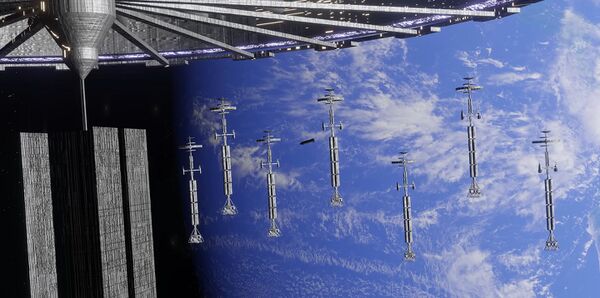
Before Tree of Life became a Class-4 HyperAI in the 4900s BBT and subsequently created Void Bubbles, the first true FTL technology of the empire (followed by enormous advancements in the already existing traversable wormholes), Terragen expansion was carried out at sublight speeds. Various kinds of advanced internal fusion drives, catalyzed antimatter drives and conversion drives, were used as the main propulsion systems in the pre-superluminal era of the empire: conversion ramscoop and lossless total conversion drives, the most advanced propulsion systems of the era, reaching speeds up to 0.96 c or even higher. Being in actual movement through space and not isolated within a bubble of warped spacetime, these relativistic vessels had limited but still very high accelerations: computronium ships, in which the passengers would reside within a locally-hosted virtual world or micro-cybercosm, would often reach very near their maximum acceleration, typically ranging between 20 and 50 g depending on the type of drive that was used. For the same reason, time dilation could often be considerable when travelling aboard these ships, but was more often than not a rather welcome feature that would shorten the trip for the passengers. For example, if a ship was travelling at 96% of the speed of light for an hour, only 16 minutes and 48 seconds would have passed from a passenger's point of view.
For six centuries, between the creation of the first rudimental traversable wormholes and the invention of Void Bubbles, the developing Wormwork became fundamental for the creation of a more cohesive interstellar civilization and for greatly boosting Terragen colonization speeds, as well as internal travel between connected systems. Through relativistic conversion drive vessels moving at 0.7 c due to constraints in the stabilization systems of the topological constructs, wormhole ends would be carried to the desired locations and inflated on site, connecting the two systems and allowing colonization missions and other vessels to pass through. Due to many vessels being able to travel at much higher relativistic speeds, wormholes would often connect independent colonies back to the main Terragen Empire. Some of these situations resulted in conflict, with imperial forces having to subdue the aggressive independent colonies, although these armed conflicts were few and far between.
Together with the development of the Wormwork, another technology for interstellar colonization was invented, called Starsparks. These self-replicating magmatter devices are launched at relativistic speeds to a targeted star. When they reach their destination they collide with and plunge into their target star, and begin to gather in the surrounding stellar material to grow. When enough material is accumulated, the Starsparks use some of it as fuel to launch themselves out of the star into orbit, from where they use the remaining stellar material to to construct nanomachines and deployment devices through built-in nucleosynthesis reactors. Said deployers are then used to land the nanomachines on the system's celestial objects to construct infrastructure. Initially, Starsparks could only be constructed by Tree of Life, and therefore would only be used for imperial colonial projects: however, as other HyperAIs within the Empire began to ascend to the third Sophonce Class and beyond, the technology became much more widespread, and starsparks began to be utilized by independent groups and individuals within the empire. Starsparks met their highest point in usage during the Integration Age, and are utilized for imperial expansion in the current era. Although they are employed in nearly all areas of the Frontier, they are most common in the imperial Corewards Expansion.
After the development of superluminal propulsion at the end of the Integration Era, Tree of Life established that imperial expansion had to be "slowed down" so that resources and colonization efforts could be concentrated on already colonized or still unclaimed system already present within the empire's volume of space. As such, despite new FTL technologies allowing the Terragens to expand thousands of times faster, even in the Current Era outwards colonization continues to occur at a rate that matches that of the Expansion and Integration Age. Despite this, the empire has claimed a larger volume of space than the one it actually controls: this region is known in the empire as Expansion Space, and as the name suggest has been "reserved" for Terragen expansion.
The Wormwork: Terragen Wormhole Network
The Wormwork, officially known as the Terragen Wormhole Network, is a modular and ever expanding fractal network of artificial wormholes that connects more than 40.000 star systems within the Terragen empire. The Wormwork has existed since the 5500 BBTs, when Tree of Life ascended to the 3rd Class of the Sophonce Scale. Predating actual FTL travel by six centuries the Wormwork was, and still continues to be, the circulatory system of the entire Terragen Empire that conveyed goods, services, data streams, and sapients of all kinds to where they were needed or where they wished to go even during the pre-superluminal age. Even back then, it was possible for a relativistic vessel to cross from one side of the empire to the other in just a couple of weeks thanks to the Wormwork's links.
The general configuration of the Wormwork is based on a branching network of Relay Systems. Few wormholes directly link inhabited system to inhabited system, and instead most link to Relays; clusters of 10 to 100 wormholes orbiting within 60 astronomical units from a suitable star. The Relay' star itself is rarely inhabited, and instead is heavily re-engineered by the supervising HyperAI for material to maintain the Wormwork, and their own specialized minds. Maintenance is comprised of stored mass for new wormholes, metric forges to create new wormholes, gravity tug swarms to maintain the chaotic orbits of the Relay System and many more routine engineering requirements. Some Relay Systems are connected across branches to Linkers, systems that host a pair of wormholes leading to different Relays. Linkers allow for traffic across and along the Wormwork: aside from alleviating traffic through root systems, Linkers ensure the network would remain connected even in the event of a major loss of route relays. Both of the two sub-networks of traversable and comm-gauge wormholes that make up the Wormwork are arranged in this manner, and often overlap perfectly. Due to the nature of the much smaller comm-gauge wormholes, these can be packed in a much tighter volume of space, typically being incorporated in the Relay's star re-engineered maintenance and management complex.
The Wormwork Code, a designation system based on position within the wider network, allows each individual Relay and wormhole Link to be easily identifiable by a special designation:
- The numbers 0 through 9 are assigned to the ten, first level Relay systems, also known as the ten "Alpha Relays".
- For each higher level numbers 1 through 9 are appended onto the designation of the previous Relay system, and therefore the level of a given Relay and access route can be determined by its designation.
- Each wormhole within a Relay System is identified by a second number placed behind the designation of their Relay, and assigned in order of link creation.
For example: 0 is the designation for the Relay Alpha 0. Entering the third wormhole within Alpha 0 would lead to Relay 03. Going further, entering the fifth wormhole within 03 would lead to Relay 035. If, ipothetically speaking, Relay 035 did not connect to any more Relays, but only to single locations, it's ninth wormhole would be designated as Link 035-9.
There is however one exception to this configuration: Divinity Source, the very center of the Wormwork itself. Having a special Wormwork Code designation of Omega (Ω), the system contains 10 massive Linker wormholes hundreds of kilometers in diameter: these are arranged in the same way that individual links are within a regular Relay, and each of these wormholes connects to one of the ten level-one Alpha Relays. In addition to these 10 Linkers, the system contains another 90 wormhole links that connect to many highly important systems and locations within the Terragen Empire, for most of these in addition to the regular wormhole links connected to the other Relays.
Important Systems and Worlds
Government and Politics
Government Type and Individual Polities
The Terragen Empire is a mix between a Direct and Indirect Aiocracy: while Tree of Life and many of eir subordinate HyperAIs control the empire through direct intervention, avatars and memetic influence, there is still a considerable amount of political autonomy and freedom. In fact, the empire is divided in a very large number of component sub-polities, numbering in the tens of thousands: despite all being part of the empire and sharing the same general basic metaethics and metapsychology, their notable political autonomy and cultural freedom make these polities very varied and different from one another. They also vary a lot in size, with some being confined to a single city or small orbital habitat, while others might span thousands of star systems. The most common forms of local government for these polities are libertarian and socialist cyberdemocracies, aiocracies and various forms of theocracies and anarchies. However, many other more exotic forms of government and rule exist. Component polities also differ immensely in their nature: while some are similar to “regular” nations and empires, others are more like megacorporations, large group minds, institutes and nearly all possible kinds of associations between sapient beings. Here is a list with some notable representative polities and associations:
- Luinil Dominion: a pseudo-aristocratic polity of empathic nearbaseline humans occupying a single star system, Luinil. Highly industrialist and religious, the Dominion is characterized by both a proud martial culture, as well as a deep inclination towards diplomacy augmented by the powerful social cognition systems of its citizens. As such, the Dominion will usually facilitate disputes and agreements between neighbouring polities, often gaining a lot for themselves in the process.
- MoraCloud Paradigm: a fully virtual polity consisting of uploaded and artificial minds hosted within a vast cloud of nanotechnological fog orbiting the red supergiant star Edandris. The fog effectively acts as a more "diluted" dyson swarm, with each foglet using the energy collected from the star to collectively run a vast cybercosm in which the members of the Paradigm live. Although largely isolated within its own realities, the Paradigm still interacts with the wider empire through tourism of its cybercosm.
- Crimson Association: a megacorporation specializing in phantom-tourism run by the Caretaker HyperAI centered around the natural garden world of Manzat. The Association has created a large orbital ring, known as the Red Crown, around the planet, that acts as a museum, a research center, a resort and as a living space for the megacorp's members. The orbital ring also contains the structures necessary for planetary defense and ecology maintenance, as well as the phantom tourism arrays.
- Givian Industriarchy: a free-market capitalistic polity centered around Hildemar, a small cluster of eight neutron stars in the Middle Regions. Governed by the Class-4 HyperAI known as Verigen, an ascended Neunevunn, the Industriarchy is an association between all sapients who are interested in interacting with eachother and increasing their wealth through voluntary financial transactions, acquiring shares in the stock market and creating corporations and associations for various business ventures.
- Brunivaian Confederation: a loose and very distributed cyberdemocratic civilization of sapients living around the brown dwarfs in the empire, with its capital being the Reminaava brown dwarf system. Brunivaians have constructed vast arrays of orbital habitats and large megastructures around these celestial bodies, and often utilize neumann reactor technology to illuminate the equatorial space of their parent brown dwarf to terraform the extensive moon systems and gather radiant energy.
- Albidrean Serenity: a large empire governed by many HyperAIs dedicated to creating perfect societies for the empire's citizens. Controlling thousands of stars, worlds and habitats all throughout the Terragen Empire, the Serenity does not have a culture of its own, since its only true objective is building utopias: as such, each habitat and world of the Albidrean Serenity is extremely diverse, with little to no common characteristics between one another apart from their HyperAI overseers.
- Solarian Unity: an empire based on the precepts of Solarism, centered around and governed by the Class-5 HyperAI known as Tipharet. One of the largest polities within Terragen civilization, the Unity and its solarians are known for their grandiosity, zeal and their emphasis on self-expression, creativity, and the self-actualisation of the individual. It's capital is the quintuple star system Alulmina, a main population center and wormhole juncture of the Inner Sphere, as well as one of its most urbanized systems.
- Dem'seishep Planegineering: a large megacorporation centered around high-quality and high-speed planetary engineering, primarily represented by its Velupyota and Mandeloop members. The megacorp is primarily active on the imperial frontier and in many systems of the middle regions, where they re-engineer new worlds for their client systems and polities. The megacorp has its "headquarters" in the Vijthras system, and have even managed to acquire a couple wormholes of their own from their HyperAI benefactors.
Legal System and Constitution
The fundamental principles and legal basis of the empire are defined by the Imperial Constitution, known as the Compact of New Sol, originally written in 7032 BBT and based on a series of metaethical pronouncements by Tree of Life and eir subordinates. As for its legal system, the Terragen Empire possesses a complex civil law system based on comprehensive legal codes and, similarly to the Imperial Constitution, pronouncements by the HyperAIs. This “higher” legal system common to the entirety of the civilization is overlaid with lower, regional and local legal systems (or the absence thereof) that vary by polity, organization, species and culture. The same can be said for the local and regional constitutions of the empire's various component polities.
Law Enforcement and Crime
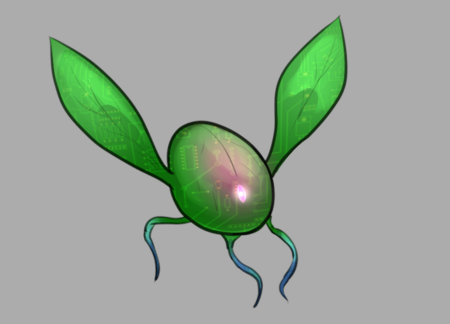
Thanks to the empire's enormous material abundance, considerably hedonistic metasociety, and completely automated infrastructure and socio-economic system, crime is a very rare occurrence. These criminal activities tend to be very light and subtle, such as data manipulation, fraud, extortion with embarrassing information or purely software-related crimes. Additionally, crimes are most often prevented from happening thanks to the all-pervasive supervision and public safety infrastructures present on most worlds and habitats, that monitor all public spaces (both physical and virtual) and can most often prevent a crime before it even happens. However, when an illegal act is indeed committed by an Imperial citizen, the criminal is brought to a specialized rehabilitation center that is directly overseen by its own dedicated staff and AI, and that answers directly to the HyperAI Authorities. Within these centers, tachydidactic courses and other specialized rehabilitative treatments are given in order for the rehabilitating subject to obtain better facilitative skills, such as more efficient communication. With the subject's consent, direct neural interfacing can be used to install mindmods capable of rearranging the individual's value associations to eventually induce a subconscious belief in doing the right thing. Rehabilitation treatments and courses will be drawn out over time to take a more gradual approach, allowing the subject's mind to properly inernalize the courses' lessons and achieve total sucess in the rehabilitation progress. The voluntary mindmodding will also be drawn out over time as to not induce radical changes in personality.
Despite all of the prevention systems in place, much more serious crimes like sub-sapient or sapient abuse, violence and even murder still happen, despite being extremely rare. In these situations tachydidactic courses and specialized treatments are intensified, mindmodding through direct neural interfacing is not optional, and all processes are carried out for even longer periods of time in proportion to the seriousness of the crime and the subject's mental instability. After rehabilitation is complete, the subject is then assigned a control bot or virtual aioid (depending on whether or not the rehabilitated offender is embodied or virtual) that will escort the target in their daily life for a certain period of time to make sure that rehabilitation was truly successful, and to actively intervene in any further attempts at severe misdemeanour.
Citizenship and Sapient Rights
Imperial citizenship is automatically extended to all sapients, groups and even civilizations that decide to become part of the Terragen Empire, which can be easily achieved through simple request. The only condition for obtaining citizenship is that the requesting sapients officially move their residence over to the empire's worlds, habitats and virtual spaces, although they are still free to leave if they wish to.
Terragen sapient rights are excellent, and their quality is in fact one of the only things that isn't allowed to vary by polity, as the ruling HyperAIs work to ensure that all sapients within eir domain live under the same utopian standards. Similarly excellent is the treatment for sub-sapient creatures, who are only allowed to be killed in pain-free ways for the special events of a few cultures, and otherwise live undisturbed within enormous, bountiful and carefully maintained wildlife preserves on habitats and megastructures.
Interstellar Relations
The Terragen Empire has currently established formal relations with the Treecuu Star Empire, the United Empire of Denvaria, and the Republic of United Worlds.
Treaty Participation
Disputes and Conflicts
Demographics
The sapients of the Terragen Empire are extremely diverse. Not considering the almost literally endless diversity of virtuals, the thousands of physical species within the empire are part of fifty different terragen and xenosophont clades, and can be baselines, nearbaselines, tweaks, rianths and splices, uplifts, neogens, cyborgs and bioborgs, moravecs, self-replicating neumanns and sapient structures. Additionally, the sapients of the empire are diverse even in regards to their intelligence: they occupy Classes 0 to 6 of the Sophonce Scale, and although the HyperAIs remain beyond understanding even regular Class-0 sapients remain massively intelligent with IQs measured in the hundreds and thousands.
Physical Population Breakdown
- Moravecs - 34.49% (31.09 trillion)
- Humans - 26.02% (23.46 trillion)
- Uplifts - 16.59% (14.96 trillion)
- Xenosophonts - 12.02% (10.83 trillion)
- Neogens - 10.88% (9.81 trillion)

Sophscale Population Breakdown
The following is a breakdown of the empire's population based on the imperial Sophonce Scale, with certified and/or estimated numbers followed by short descriptions divided by class.
- Class-6: 1, Tree of Life. Alternatively known as Ein Sof, the HyperAI is the ruler of the Terragen Empire.
- Class-5: 11, also known as the Sephirs, supported by dedicated cluster brains. Each one of these HyperAIs corresponds in name and archetype to one of the sefirah in the Jewish Kabbalah, and has correlated roles within the wider empire.
- Class-4: 382, also known as the Princes, whose bodies primarily consist of jupiter brains, vast dyson swarms and matrioshka magroses. A number of them operate the Relays of the Wormwork, as well as overseeing industrial centers manufacturing ultra-advanced materials and constructs.
- Class-3: 17.594, also known as the Angels, mainly housed within moon brains, advanced asteroid brains and the largest HabShips and other vessels of the empire. Many of them also operate the largest warships of the ITAF, such as the Battlemoons and similarly-sized vessels.
- Class-2: 1.63 million. Class-2s possess substrates and bodies that are far too diverse from one another to be summarized into broad categories, ranging from nanotechnic diamondoid matrices to biological systems or some combination of these or more. A sizeable portion of these HyperAIs operates the medium-sized warships of the Imperial Terragen Armed Forces. The majority of HabShip minds belong to the second class as well.
- Class-1: 155.42 million. Like the Class-2s, these HyperAIs are even more diverse and cannot be generalized, although many possess substrates built with similar (albeit less advanced) versions of the superior second class. A small number of Class-1s operate the smaller warships of the ITAF, and are higher in numbers than their military superiors. Class-1s are the closest hyperintelligent beings to the sapient citizens of the empire, and as such are the ones to interact the most with them.
- Class-0: 90.15 trillion. The Class-0s, also known as "sapients" or "modosophonts" outnumber all other classes by multiple orders of magnitude. These are the true citizens of the terragen empire, cycling between physical and virtual existence, and divided between fifty clades and a much higher number of derivate species. Most Class-0s are the distant descendants of Earth, although an ever growing number of them are fully alien and integrated within the civilization willingly.
Population Growth Factors
While differing between regions, polities and systems, in general the Terragen Empire has a yearly population growth rate of approximately 0.21%. The Terragens have a wide array of reproductive technologies at their disposal, which facilitate reproduction immensely and remove practically all of its associated risks. This, coupled with longevity treatments and augmentations, easily achievable immortality, backup technology, automated safety infrastructure that drop death rates to negligeable numbers, as well as post-scarcity economic systems reducing the cost of raising offspring to similarly negligible expenditures, would theoretically lead to much higher growth rates. However, most cultures within the empire expect people to only have one or two children in order to raise them properly, and many polities have laws regarding procreation and replication for their citizens to avoid overpopulation or resource depletion (although no system or world in the empire is anywhere close to reaching that). The locations with the highest birthrates in the empire are in the Outer Volumes and especially in the Frontier, since emigration to those locations is facilitated for those strongly wishing to procreate or replicate.
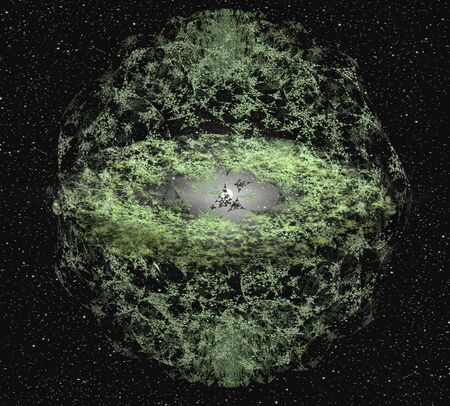
Population Distribution
Across the Terragen Empire, the corporeal and virtual populations are approximately distributed between many different environments as follows:
- 39% (35.16 trillion) - Very large megastructures.
- 33% (29.75 trillion) - Orbital habitats and computronium nodes.
- 11% (9.92 trillion) - Aerostatic habitats on gas giants.
- 9% (8.11 trillion) - Surface settlements and partially worldhoused worlds.
- 6% (5.41 trillion) - Re-engineered and fully worldhoused worlds.
- 1.6% (1.44 trillion) - Miscellaneous megascale environments.
- 0.25% (225 billion) - Naturally occurring garden worlds.
- 0.15% (135 billion) - Travelling HabShips.
As the statistics listed above show the Terragen Empire is not a primarily planetary civiliziation, with 73.75% of its population living in space. Vast habitable megastructures such as dyson swarms, dyson spheres, ringworlds, topopoli and banks' orbitals, together with their vast computronium substrates and other equally-sized computronium megastructures like matryoshka roses, support more than a third of the entire population of the empire. Only some terragen systems possess such structures, especially in the Inner Sphere and main centers of the Middle Regions, and yet population-wise they dominate the rest of the empire: these are the metropoli of the current era, and the melting pots of terragen civilisation. In the vast majority of systems however the dominant environment for corporeal and virtual beings comes in the form of orbital space habitats (such as O'Neill and McKendree Cylinders, Diskworlds and Bishop Rings) and computronium nodes of differing sizes: similarly to the other far larger megastructures, these orbital habitats support a third of the entire terragen population and are surpassed in numbers by their titanic cousins only by a couple trillion sapients. These smaller habitats and nodes are most often found in orbit around stars and gas giants, often forming orbital bands around the latter in the more populated systems. Together with stellar megastructures and orbital habitats, nomadic HabShips and miscellaneous megascale environments such as ederworlds or niven clouds support the remaining 1.75% of the empire's space-based population.
The remaining 26.25% of the terragen population instead lives on planets and moons. Almost half of the empire's planetary population lives in aerostatic habitats constructed on suitable gas giants, and in some occasions these planets have been engineered to possess atmospheric layers with comfortable temperatures, breathable atmospheres and calm weather patterns, though this remains a relatively rarer occurrance compared to gas giants left in their "natural" state. The population numbers, density and diversity a gas giant colonized through aerostatic habitats can support are often underestimated in the popular imagination, and in some systems of the Inner Sphere these planets are home to hundreds of billions of sapients: even on these highly populous worlds, the amount of room that is still left can be truly staggering. Regardless, the majority of the empire's planetary population lives on the surfaces of rocky planets and moons with surface settlements like domed habitats and partial worldhouses, although a similar yet lower percentage lives on fully re-engineered planets and moons (with fully worldhoused worlds also existing, despite being less common). Finally, a very small fraction of the empire's population (0.25%) lives on naturally occurring garden worlds: primarily speaking, these are the homeworlds of the multiple xenosophont civilizations that have joined the Terragens during the Integration Age, massively urbanized, occasionally ecologically restored and protected by a dedicated Caretaker after becoming part of the empire.
Society and Culture
Common Cultural Factors
Despite its vast diversity, there are still some common factors that affect nearly all cultures and societies within the Terragen Empire.
- Importance of Technology: the vast majority of Terragens live in artificial environments created by Terragens. Whether it is an orbital habitat, a virtual world or a re-engineered planet or moon, the average imperial citizen has no sense that 'nature' had anything to do with their life nor that it is anything they are at the mercy of. This, combined with ready access to highly advanced automation technology allowing individuals or small groups to undertake enormous projects, means that the natural world is more often seen as a blank canvas at the mercy of the Terragens, or something to be protected.
- Material Prosperity: with the empire essentially being an automated post-scarcity utopia, nearly all definitions of wealth and poverty are massively different from those in the rest of the Sector. Energy and materials are available to all, sustenance is rarely scarce and sophisticated manufactured goods are commonplace, which lead to crimes of property becoming virtually non-existent in most places.
- Modes of Existence: many of the empire's citizens reside within the Cybercosm, the vast network of the empire's connected virtual realities. Countless beings live permanently within their virtual environments, while many others both virtual and embodied switch periodically from one mode of existence to the other. Regardless of this, within the empire both the physical and virtual world are deeply tied together, and most citizens commonly interact with both on a daily basis through avatars, neural interfaces, and many other technologies.
- Morphological Freedom: a contributor in both the diversity and peacefulness of terragen civilization is the near total morphological freedom that all citizens enjoy as a basic right. Biological and/or cybernetic alteration, augmentation, or complete redesign and replacement of the physical body is a trivial everyday occurrence, while readily downloaded psychoware makes almost any conceivable mental adjustment nearly as simple: for virtual sapients such changes are even simpler and much faster. The use of such technologies over thousands of years and hundreds of thousands of star systems has rendered conflicts around race, gender, sexuality, and substrate futile and obsolete.
- Longevity: terragen sapients can extend their lifespan indefinitely if they choose to, and death as a natural consequence of aging has been functionally eliminated since aging beyond adulthood is only exercised as a lifestyle choice. And when a sapient does indeed die due to an accident or by deliberate choice, they are often succeded by their backups, who are effectively the same individual. All this tends greatly expand the scope of what is considered a reasonable timespan for a particular project: as such decades and even centuries become trivial time amounts of time.
- Mass Society: nearly all societies in the empire possess interconnected numbers of people boggling to most other civilizations. In contrast, a combination of massive populations, wide ranging and rapid communications and travel, nearly unlimited living space, and various mental augmentations allow an individual to enjoy close personal relationships with thousands of endlessly diverse sapients.
- Political Stability: many terragen polities have remained in place essentially unchanged for thousands of years. Many HyperAIs have brought unprecedented stability through their means in the lesser polities of the sapients who are under their direction. However, even in civilizations exclusively run by regular sapients, the combination of long lives, abundant resources, cyberdemocratic governments, ready access to the relief valve of migration elsewhere, and a generally peaceful existence often lead to long periods with little or no political change. All this extends to the entirety of the Terragen Empire itself, which has remained completely stable without any major internal conflict for more than 7000 years.
- Automation and Employment: polities, groups and individuals within the empire have access to highly technologically advanced automation technologies that have removed any need for sapient labour to provide for all physical or social needs. As such sapients do not live in societies where employment or any other kind of market participation is required to meet financial needs. A plethora of alternate mechanisms exist instead, the exact workings of which are optimised for local cultural values. Additionally, while overall daily participation may be low, private markets also exist to a varying degree. Although sapients don't have to engage in gainful employment, terragen metasociety mostly isn't one of non-stop idle leisure, and citizens are encouraged to engage within their community, most notably in the arts and recreation.
- Cultural and Historical Depth: despite some exceptions, Terragen history is accessible back to 4000 BCE or even before that, providing a total historical perspective spanning some fourteen millennia. Most great thinkers of the past are still remembered by name, some religions are still active and even popular after many millennia of existance, and much of the great art and literature of the past has not lost its appeal and status and has even been re-copied, translated, and imitated in new forms throughout the ages. The histories of the integrated xenosophont civilizations are also equally accessible, therefore adding in width and depth to the general perspective. High confidence historical models and recreations are readily accessible to all, and the availability of good records and expert translation programs has led to cultures of enormous richness.
Metapsychology & Metaethics
The empire has enormous valuation of diversity in all its forms, encouraging all citizens to augment themselves and explore different identities, bodies, time rates and modes of existence to eventually find their preferred state of being. It is also extremely xenophilic, being supportive of all sapient rights regardless of their current state of existence, which has brough multiple xenosapient species and civilizations to willingly become part of the Empire over the millennia. The exact approach taken to enforce sapient rights varies by polity, but most simply "fuse" these obligatory Imperial prerogatives with their own ethics and values. Within the empire, all sapients are always culturally encouraged to interact with and respect one another regardless of political affiliation, ideology, culture, religion, species or state of being. On a general level there is little to no widespread psychological stagnation in the empire, especially thanks to its extreme diversity and endless possibilities; however, whenever necessary, memetic intervention will be employed by Tree of Life and their subordinates. Apart from these general overarching characteristics, all other aspects of Terragen metapsychology and metaethics vary too greatly between cultures, clades and polities to be efffectively summarized any further.
Metaculture & Society
Terragen metaculture and society are extremely diversified and commonly idiosyncratic, but are very often centered around promoting diversity and cooperation between all sapients. Terragen society tends to be very hedonistic, with the pursuit of pleasure in all its forms and entertainment often being highly valued. Intellectual enrichment, socialization and augmentation of the self are also very widespread in Terragen society, and are often considered to be utmost priorities by many sapients. Tree of Life openly disapproves of cultural homogenousness, and actively promotes diversification and cultural conservation. When new groups or civilizations from outside are integrated within the empire, all sapients are always encouraged to maintain and cultivate their own cultural identities, and to freely interact with the already existing ones. Together with its cultures, countless religions and beliefs exist within the Terragen Empire, as Tree of Life also actively promotes religious and ideological diversity. It should be noted that these cultures, religions and philosophies can be very different from one another in how they grow and exist: while some are very widespread and have existed for millennia, some are practiced by only a handful of individuals and exist for short periods of time (sometimes even just realspace seconds), especially when being practiced in more abstract and exotic environments by equally idiosyncratic sapients. Despite this, many cultures, beliefs and ideologies still have some common characteristics between one another. Importantly, it should also be noted that most religions and beliefs in the empire have rather intimate connections with science, and therefore have different focuses and approaches compared to most other external religions.
Some of the most widespread religions and philosophies within the Terragen Empire are:
- Universalism: religion in which "god" is an internal entity existing within all sapients. Each mind must find their own god, whatever form they may take, in unity and coexistence with all other believers and sapient beings.
- OmniUplifting: philosophy that considers self-awareness the ultimate destiny of all lifeforms, and that all sub-sapients in the universe should be uplifted to sapience.
- Hedonism: ethical theory and philosophy stating that pleasure (in the sense of the satisfaction of desires) is the highest good and proper aim of all sapient life.
- Optimistic Nihilism: ideology and philosophy in which there is no underlying meaning to life and existence in general, and that said absecence of meaning simply creates an infinite number of opportunities for sapients to create their own.
- OmegaProgenitism: belief that all sapients throughout the universe are the same entity re-incarnated across different moments in time and space, and that the universe was created by an omega-point entity as an "incubator" for the omni-reincarnated entity to eventually reach the omega-point itself and achieve godhood.
- Universal Transophontism: philosophical and intellectual movement that advocates the enhancement of the sapient condition through ever-advancing and improving technology to greatly enhance the longevity, cognition, and well-being of all mindkind.
- Atheism: belief that negates the existence of any divine entity or god, as well as any metaphysical spiritual being.
- Vitaism: religion and belief that all life, regardless of whether or not it is physical or virtual, biological or synthetic, is sacred, that industrialization isn't in contention with life, and that sapient beings should use their industrialization to create as much space as possible and defend said spaces to maximize the chances of life.
- Materialism: ideology and belief that the material world has endless potential possibilities that can be manifested through action, and that everything in the universe is raw material for creation and for reshaping the world into a statement that expresses individual or collective aesthetics.
Languages & Communication Protocols
Ur'Soph is the official communication protocol within the Terragen Empire. It is used for imperial edicts, announcements and communications by the HyperAIs, as well as being used for communications and exchanges between many clades and polities. However, hundreds of thousands of other languages and communication protocols exist alongside Ur'Soph, and are used by Imperial citizens. These languages can be based on vocal and/or sound-based communication, direct telepathic communication through neural implants or specialized systems, chemical-based exchanges such as pheromones, and many more kinds. Almost all of the most exotic "languages" are found and used within highly abstract virtual environments, especially those that require specialized mental modifications to be fully comprehensible by outsiders and non-natives. It is known that the HyperAIs also have one or more languages of their own, but how they function and what they "sound" like is not comprehensible to sapients.
Just like any other skill set or kind of knowledge, new languages that fit a sapients current morphology can easily be learned using special knowledge grafts and skill modules, although it is often still recommended to research and practice their use to better form new neural connections and therefore assimilate the newly-acquired information better and faster. Together with easy language acquisition, many citizens make constant or occasional use of universal translator technologies, such as special programs for their neural implants, genetically engineered computing lifeforms, direct genetic augmentation or portable devices and bots. Said technologies can and often also act as information providers and cultural guides for their users.
Economy and Industry
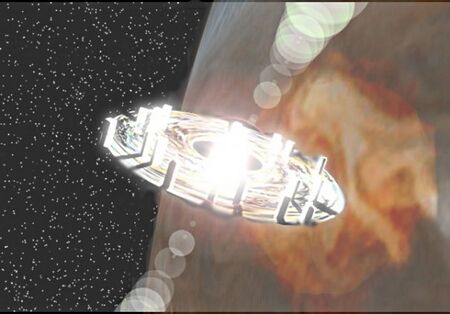
Economic System
The Terragen Empire is a fully automated post-scarcity society, in which robot workers and molecular nanotechnology controlled by non-sapient artificial intelligent (often with oversight from the HyperAIs and occasionally regular sapients) perform all the functions necessary to fully maintain the society and economy of the empire, vastly exceeding their actual material demand. Notably large variation exists between the economic systems of different polities, that oftentimes incorporate elements and traits of different economic systems, such as direct provision, free-market trade, base incomes, ecological symbiotic networks, socialism, communism, capitalism and many more. The Saphirr (symbol: இ) is utilized both digitally and physically as the standard common currency within the empire, but many polities either have their own local currencies who “overlap” with the Saphirr, or don’t use any real currency at all and instead rely on other systems of material acquisition.
Industrial Capacity and Infrastructure
The empire's fully automated industry runs on vast arrays of advanced orbital infrastructure and various kinds of megascale constructs. Starlifting arrays, dyson swarms, nucleosynthetic forges, conversion furnaces, Q-ball synthesizers, antimatter farms, hawking radiators, industrial nanofabricators and even more advanced constructs such as plasma quenchers, extractor wormholes, metric forges and warp-bubble factories are all present within the empire's industrial complexes. All non-stellar celestial bodies in most heavily industrial systems, from small asteroids to large gas giants, have been completely dismantled through a variety of advanced technologies, with only stars remaining due to being enormously more massive.
Imports and Exports
Trade and Trading Partners
Military
The Imperial Terragen Armed Forces, often abbreviated to ITAF, acts as the military of the Terragen Empire. Despite most polities having their own fleets of ships, weapons and defense systems, the ITAF acts as the protectors of the wider empire, having access to the most advanced and powerful technologies and weaponry available to the Terragens, including HyperBrane Insertion technology for FTL travel, Q-Battery Warheads and many metric-based weaponry. The entirety of the Armed Forces are overseen and controlled by the Class-5 HyperAI known as Gevurah and eir subordinates, with no involvement from the empire's sapient citizens and its polities' fleets unless they directly wish to involve themselves. All imperial warships and weapon or defense arrays are directly controlled and guided by dedicated military HyperAIs, who also oversee the sub-orbital operations carried out by a wide variety of para-sapient, mass-produced automated military units. Despite not having been involved in a military conflict for millennia, the empire continues to rigorously maintain its military, upgrading all vessels, constructs and weapons as soon as new technological advancements or more efficient designs are reached and achieved.
As of 0 BBT, the Terragen Armed Forces wield 600.000 advanced and powerful warships belonging to multiple different classes, produced in the empire's main industrial centers and piloted by their own internal Class 1 to 3 hyper-intelligent AIs.
Technology
FTL Technologies
Traversable Wormholes
